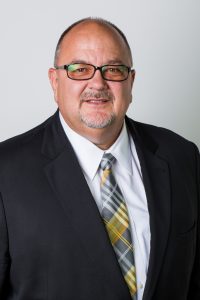Dority Emphasizes Multicultural Mandate
Appointed by the International Executive Committee at the 2016 General Assembly as Multicultural Ministries Director, T. Wayne Dority comes to the office having served as State Overseer of the Pacific Northwest, Texas, and Ohio. Prior to denominational leadership he served as pastor in South Carolina for twenty-one years.
“It is with great appreciation and honor having been appointed by the International Executive Committee to the office of Director of Multicultural Ministries,” Dority stated. “Our mandate is to develop churches in the United States and Canada, countries whose population is rapidly changing, largely through immigration. Traditionally we have focused on establishing faith communities among ethnic minorities. Our efforts have reached out to Hispanics, Latinos, Koreans, Native Americans, Asians, and Pacific Islanders.”
As of 2010, 36.3 percent of North American population age 18 and older was of a nonwhite or
ethnic minority. Even more significant, 46.5 percent of the population age 18 and under was ethnic minority, nonwhite, or both. Today, these percentages are approaching or surpassing 50 percent. Unfortunately, the church is now behind the curve in keeping pace with the changing population in North American communities.
“Traditionally, we have misinterpreted the Great Commission—assuming it to mean, ‘like reaches like;’ that is, Caucasians reach Caucasians, Hispanics reach Hispanics, African Americans reach African Americans, and so forth,” Dority related “But the Great Commission says we are to reach all nations. From its birth, the church was conceived to be multilingual, multicultural, and messy. The Book of Acts and all of Paul’s epistles depict a church that is a real mess. So Christ’s church is challenged to develop not only ethnic congregations, but also multicultural ones—congregations that look more like the neighborhoods in which we live. This is the vision in Revelation 7:9, ‘After this I looked, and there was a great multitude that no one could count, from every nation, from all tribes and peoples and languages, standing before the throne and before the Lamb, robed in white, with palm branches in their hands.’ The vision of a church made up of people from all nations has been present from the beginning. A foundational text for the church from Joel 2:28-29 says: ‘I will pour out my spirit on all flesh; your sons and your daughters shall prophesy, your old men shall dream dreams, and your young men shall see visions. Even on the male and female slaves, in those days, I will pour out my spirit.’”
Dority went on to say that it is important to understand that multiculturalism is not limited to people whose race or ethnicity differs from that of the majority or the corpus.
“In reality, some of the greater challenges of multicultural work involve not so much differences of race and ethnicity as differences of social class. We are not crossing great boundaries when we reach out to people who speak our same language and have educational backgrounds and income levels similar to ours. Mark 11:17 states an ethical imperative for the church. This is the text from Isaiah that Jesus cites while driving the money changers out of the temple: ‘Is it not written, ‘My house shall be called a house of prayer for all the nations?’’ Jesus asks. Then he adds: ‘But you have made it a den of robbers.’ If our places of worship are not houses of prayer for all nations, then what are we robbing people of when we are not multicultural? What rightfully belongs to people that we, in our mono-cultural ways, are stealing from the abundant life that God has ordained for all of us? I don’t think it’s possible to conceive of a true church in North America today that will not be multicultural.”
Dority concluded his remarks by saying, “We’re told that the Sunday morning worship hour is the most segregated hour in North America. But there is also good news to celebrate. Many urban churches and some rural ones are developing multicultural congregations. It is not a question of developing or initiating multicultural work in our Church and churches, but of becoming aware of what is already happening—and joining in. The Church of God invests in multicultural ministries not because we have to, but because, if we are really called to be the body of Christ, we have no way to answer that call except by being in partnership with one another. Each tradition, each nation, and each socioeconomic or cultural grouping has its own richness. Our capacity to enter fully into the experience of being the body of Christ hinges on the ways we can understand and incorporate one another’s spiritual traditions into our understanding of discipleship. Therefore, it is the purpose of Multicultural Ministries to facilitate the FINISH commitment by relating, resourcing, revitalizing, reaching, and releasing people groups throughout North America.”





